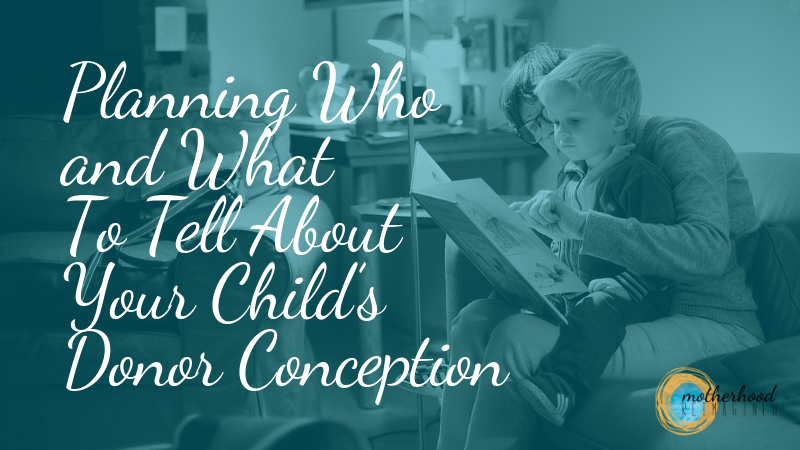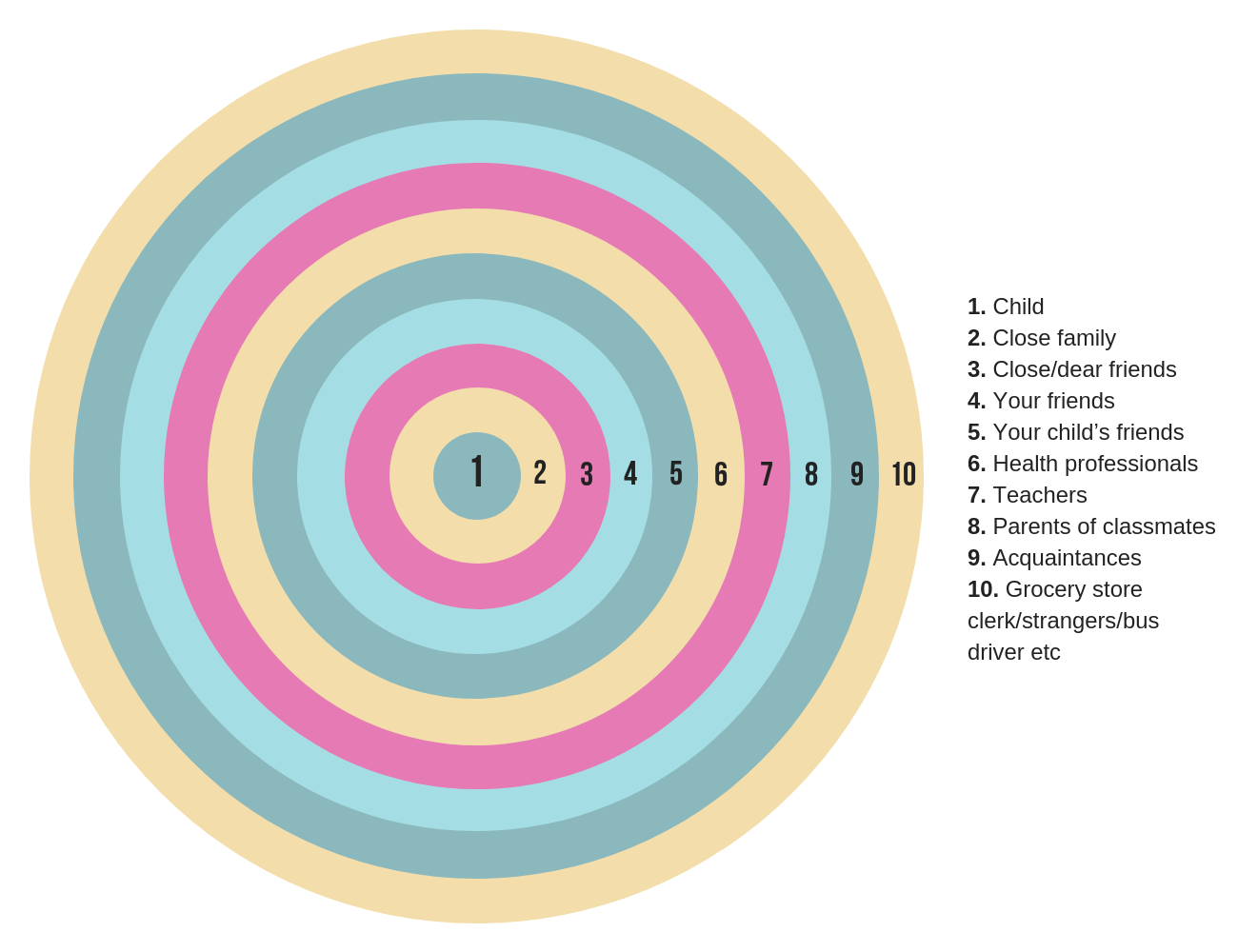
Planning Who and What To Tell About Your Child’s Donor Conception
One of the most common concerns people bring up to me is who and how to tell other people about their child’s donor conception. It most regularly comes up for me when I’m talking to women about the use of an egg donor, but it’s relevant for anyone who’s used a sperm donor, adopted or has any sort of unconventional birth story.
Many women say to me, “I’m thinking about using donor eggs but I don’t know how and what I would discuss with other people?” They lump “other people” into one category without realizing it. And then they assume they need to have provide the same information across all kinds of people in their lives. And their mind gets jumbled and confused when they see it this way.
But telling everyone in your life the same information would be absurd. If you have an unconventional family story, you are going to need to approach the topic with your child, but also with family and friends, as well as teachers or even nosy strangers. And the information you share will be different for every person. This does not make you inconsistent or untruthful. Think about the information you share with your doctor vs the grocery store clerk, or close friends vs acquaintances. The same is true regarding your child’s origin story.
I like to visualize it as concentric circles with you and your child/children in the innermost circle. Then think about who belongs in the circles as you travel to the outermost circle which would be random strangers or the equivalent of the grocery store clerk.
Types of Relationships
Some distinctions that may or may not make sense for you are as follows:
- Child
- Close family
- Close/dear friends
- Your friends
- Your child’s friends
- Health professionals
- Teachers
- Parents of classmates
- Acquaintances
- Grocery store clerk/strangers/bus driver etc.
Levels of Information
After you’ve thought through where in relation to you or your child people fall on the spectrum of closeness, it’s time to start thinking about the variations in what people need to know.
The full story with all details.
For me this is an absolute must with my child. I want to instill a sense of pride and normalcy around his origins and I never want him to be surprised about any part of his story. So, I’ve been telling him about his donors since he was born. Research shows that being open and honest with your child about their donor origins is very important. And that starting young, even before they understand is the best idea. Yet, it’s up to each and every parent to decide who gets the full story–is it your child and close family members? Dear friends? Some people are very open about the details of their conception to many people they meet. For example, I’ve been very open about my son’s donor conception because I want to educate others and reduce shame around infertility. But others may have very old-fashioned or religious people in their lives who they just don’t feel comfortable telling–their innermost circle might only include their child.
I cover how to approach the donor conversation in depth in my Guide to Discussing Alternative Family Structures so be sure to check that out. But an example might look like:
“I wanted a baby as long as I could remember. To make a baby, it takes a seed from a man and a seed from a woman and a woman to grow the baby. Sometimes the people who provide the seeds are the parents and sometimes they are not. I wanted you so badly and I loved you so much that even though I did not have a husband, I used a seed from a very generous man in order to make you.
If you also used an egg donor, you might add, “I also didn’t have any seeds of my own so again, another very nice women gave me a seed. A doctor put them together and put them in my belly so I could grow you and be your mom. And I’ve never been so happy in my life.”
Pertinent details for medical treatment
Donor conception is relevant for medical providers or other health professionals that may be treating your child. For example, you may know that the donor’s family has a history of asthma or seizures. Or, in my case, it’s relevant that my doctors understand that I share no genetic connection to my son so his family health history is a mystery beyond what I know from the donor profiles.
When asked to fill out the health history part of my son’s medical forms I tell them that I used donors and therefore I have incredibly limited family medical history.
Need to know basis
Sometimes circumstances come up that call for more information. For example, there may come a time in school when they kids draw family portraits. Or when other kids start asking about why your child doesn’t have a father. Some people may be very upfront with teachers from the outset, proactively telling the teacher about their family structure so that the teacher can help educate the entire class about various family structures. This may be different for you depending on the type of community you live in and the attitude you suspect others may have about unconventional family formation.
In my case, my son attended very progressive schools and I thought it was important to arm his teachers with the knowledge of his origins. I even brought appropriate books to school that the teacher could read about how many kinds of families there are. And when my son was old enough to start talking about his donors, I wanted the teachers to feel prepared so I told them during our school intake meeting.
For the benefit of your child
In some cases, the information about donor conception may be relevant to a person in order to benefit your child. For example, I actively told my son’s daycare and preschool teachers about my son’s donor conception so they could incorporate the idea when discussing various types of family structures with the children. I also wanted them to know how to answer if other kids asked why my son doesn’t have a dad. My purpose in telling his teacher’s was primarily for the benefit of my son.
To educate and inform
There may be times when it feels important to educate others in your child’s life so they know how to discuss the topic. For example, some teachers or parents may have no idea how to discuss donor conception. I like to proactively provide the framework that I prefer–which is that people, not genes make up a family. Or that it takes a seed from a man and a woman and a body to grow a baby. Sometimes the seed providers are the parents and sometimes they are not. And, likewise sometimes the person who grows the baby is the mother etc.
This education can take the form of providing books for your teachers or children. (Be sure to check out my list of books for children which discuss all manner of unconventional family structures.) Or it may simply be providing suggestions about how to have the conversation and what terms you use with your child so they can be consistent.
I’ve also found that my son’s friends parents welcome the information about how to discuss the topic if and when their kids start asking questions. One parent of a preschool friend pulled me aside worried because her son had asked why my son didn’t have a dad. She had no idea what to say.
I told her it was ok to say, “Aiden has a donor but no dad. What about telling your son it takes a seed from a man and a seed from a woman to make a baby? Sometimes the people who provide the seed are the parents and sometimes they aren’t.” I could tell she was immediately relieved to have a simple framework.
For me it was a win-win and I was grateful she came to me even though I think she was worried that she might offend me. I truly wanted to her to be able to have a have a conversation with her son that would benefit my son in the long run. If instead she had remained silent or I had been offended by her question the result wouldn’t have been so positive.
Doesn’t need to know
The random strangers you meet on vacation, on the bus or at the store don’t need to know. It’s your choice what you want to share. Sometimes I’ve very open and I tell just about anyone because I want to change attitudes about donor conception, but not everyone needs to fight that fight. And, other times I smile and nod or give vague answers when people talk about my son’s genes or lack of father etc. Just because some people know doesn’t mean others need to as well.
Putting It All Together
Now it’s time to think about who you want to tell what. Remember this may change throughout your child’s life as his/her needs shift and change, and as you get more or less comfortable with the facts and details. It’s also important to stay in communication with your child as they grow and mature to find out where they stand and give them a say. This framework may even be useful to help them make sense of who and what to tell.
How You Have The Conversation
A final thought is to remember, your child and their relationship to their donor origins should be your number one priority. Your child is taking his cues from how you relate to the topic, so be mindful of what you are representing at all times. Many times, your child may not be present for these conversations–it’s easy to pull a teacher aside and tell them what needs to be said. But other times, your child may be present! In those moments, answer the way you want your child to hear the information, not for the benefit of the person asking or needing to know.
For example, a distant friend may comment on how your child does or does not look like you. You might have made the choice not to tell people who don’t necessarily need the information about the donor. But your child is standing next to you. My advice–don’t lie but instead pluck up all your courage and pride and give an answer that conveys how proud you are of the choices you made and how much love it took to have your child. Imagine you are talking directly to your child, not the person asking because I guarantee your child is listening in that moment–and he or she matters more.
What are some of the ways you’ve framed the conversation with various people in your life? Tell me in the comments below.


